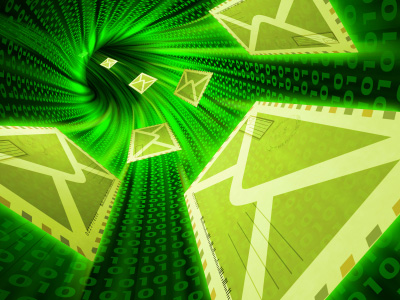
When your email arrives in your subscriber’s inbox, you generally have about half a second to catch their attention with the subject line of your email
As you may know, most people now spend more time reading their emails than they do surfing the web. Email is one of the most powerful mediums that you can use to talk to visitors, customers and prospects.
Here are 15 best practices that you can use every day in your email marketing activities. Used wisely and consistently, there’s no doubt you’ll see an increased response from your subscribers — whether it be for more feedback, more product/seminar registrations, or even more orders. Here is another post on this subject.
1. Avoiding the Spam Filters
The majority of large Internet service providers now use rigorous spam protection mechanisms to trap unsolicited email before it gets into their customers inboxes. Spam filters generally "rank" each email by a number of different criteria, and, if that email rates above a certain level (such as 10 spam points), then it is flagged as spam and deleted.
To make sure your emails don't get flagged as spam — and deleted before they even get to your subscribers — avoid using words such as 'Free', '£££', 'Save', 'Discount', etc in both the subject line and the content of your email.
2. Maximizing Click-Thru Rates
Both web pages and emails can contain a lot of text and graphics, and this sometimes makes it harder to get your subscribers to perform a certain task, such as clicking on a link to see your special offers.
Numerous research papers tell us that the majority of Internet users respond better to a plain, bold, blue text link, as opposed to a banner or button. So, if you're going to include links in your emails, make sure they are bold, blue and underlined. This will mean that more subscribers click through, meaning more conversions/sales for you.
3. The Power of Personalisation
If you were standing in a crowded mall, which of these would get your attention: "HEY, YOU!" or "HEY JOHN" (assuming your name is John). The power of personalisation can and should be used in your emails. In-fact, by simply starting your email with "Hi [subscriber_name]" instead of the boring "Hi there", you can increase both your reading and click-thru rates by up to 650%. Why? Put simply, it's because your subscribers feel like they already have a relationship with you as you've addressed them by their first name.
4. One-Click Unsubscription
If you want to grow your mailing list, then there are 2 things that you absolutely must have: a double opt-in process, and a quick way to unsubscribe. In some countries, it's actually mandatory by law that every email has an unsubscribe link in it. The unsubscribe link should take the recipient directly to a page where they are then removed — courteously — from your mailing list.
5. Signup Confirmation
Don't get accused of spamming — always, and I mean always use a double opt-in confirmation process. Double opt-in means that after your visitor initially enters their email address to subscribe to your list, you should then send them a "confirmation" email. This email should contain a special link back to your email-marketing program, which will then verify that this visitor did indeed sign up to your mailing list.
6. Tuesday / Wednesday = Increased Response
There has been much online research undertaken that has shown that the best days to perform a mail-out to your list are Tuesday and Wednesday, as this is when people are more receptive to communication. This means that they are more likely to read your content and click on links, meaning more sales.
On Mondays, everyone is still recovering from a hectic weekend. On Thursday and Friday, people are already too busy looking forward to the weekend. Our own research shows the best results are from sending out emails at around 2-3pm (GMT) on a Wednesday.
7. Repeat Email Communication
An auto responder is an email that is scheduled to be sent at a certain time interval after someone subscribes to your mailing list. Auto responders are a great way to automatically follow up with your subscribers or provide them with more information on your products/services.
For example, if you provide a free newsletter, you could setup 3 auto responders for new subscribers: the first is sent 1 hour after they subscribe. It contains a thank you message and a link to get 10% off your newly released eBook.
The second is sent 24 hours after they subscribe, telling them about your community message boards, and the third is sent 72 hours after they subscribe, in which you can offer them a special deal on becoming a paid member of your site.
Auto responders help your subscribers build trust in both your company and your brand, and this can help make it easier when trying to close sales in the future.
8. Consistency is the Key
If you're running a newsletter or frequent email publication, make sure you keep the look and feel consistent from issue to issue. By keeping the look and feel consistent, you help to maintain and strengthen your brand and your image to your subscribers, which again will make it easier to close sales when you need to.
Create a template for your newsletter and whenever you need to create a new issue, use that template as the basis for each issue.
9. On Time, Every Time
When sending a regular email to your subscribers, always make sure that it's sent on the same day, at the same time. For example, every Wednesday at 3pm. Your subscribers will come to "expect" your email to arrive in their inbox on the same day at the same time every week, meaning that they want to read your content and are generally more receptive to any special offers or promotions you may include.
10. The Half-a-Second Subject Line
When your email arrives in your subscriber’s inbox, you generally have about half a second to catch their attention with the subject line of your email. After this, they will either delete your email or ignore it. In your subject line, try and specify a benefit that the subscriber can expect by reading your email. For example, instead of using 'OurSite Newsletter Issue #1', use 'OurSite Newsletter: 10 Tips for Financial Freedom'.
11. The Free Bonus Hook-In
Free is overused these days, especially on the Internet. However, if you're looking to grow your subscriber list, then create or source a product of value to your visitors (such as an eBook or discount coupon) and offer it to them for free when they signup for your newsletter.
To make sure they don't simply type any email address into your subscription form, setup an auto responder to send them the free bonus 1 hour after they subscribe to your newsletter.
12. The Preview Pane
Popular email clients such as MS Outlook show a preview of an email when it's selected in your inbox. Always have some interesting content at the very top of your email, as this is the part that will show in the preview window of your subscribers email program. If it's interesting enough, then your subscriber will open your email and continue on reading.
13. Link-Click Testing
When creating marketing emails, try using different text for both content and links. Also try re-positioning images such as logos and buttons. After sending about 3 different emails, compare the click-thru stats and see which one worked best. Now, when you need to send marketing emails in the future, you know that you will be sending the right mix of content and images that will attract the most click-throughs, and ultimately the most sales.
14. Email-Based Learning
Add value to your website, build trust in your visitors, establish your credibility and collect more subscriptions to your mailing list by setting up an email-based learning course. To do this, simply create a series of auto responders (for example, 5) containing unique content. Then, schedule the first one to be sent after 24 hours, the second after 48 hours, etc.
15. Always Sign on the Dotted Line
Always include a signature at the bottom of your emails, as it's one of the easiest ways to attract more traffic to your website. This signature should include your personal details, your company details, and your website address. You can use your signature to link back to your website, and even to other products.

